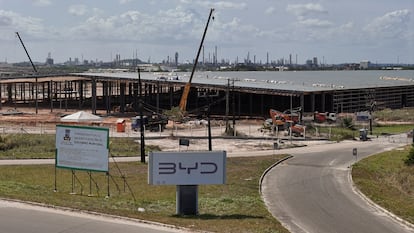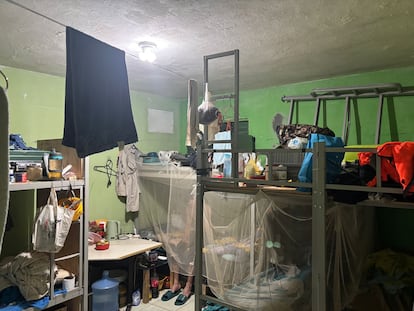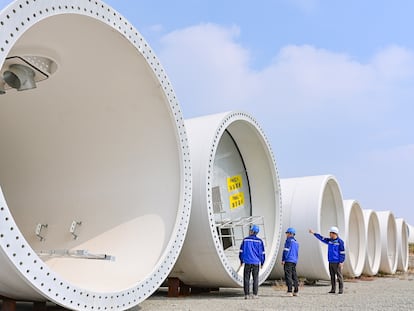BYD in Brazil: From the company’s triumphant arrival to a scandal involving ‘slavery-like’ working conditions
In late December inspectors rescued 163 Chinese workers from the construction site of a plant owned by the electric car manufacturer that has come to symbolize Beijing’s growing influence in the South American country


The plan is for the first Chinese electric cars made in Brazil to hit the market in March 2025. The manufacturer, BYD, is building a factory in the state of Bahia and this project serves as the best standard-bearer for the current sweet moment in the relationship between Beijing and Brasilia. The facility is expected to create thousands of jobs and is heavy with symbolism charge, occupying, in a quite literal sense, the vacuum left by the U.S. automaker Ford. Everything seemed to be going smoothly until, on Christmas Eve, a scandal broke out: Brazilian labor inspectors rescued 163 Chinese workers from the plant’s construction site, accusing their employer, a subsidiary of BYD, of subjecting them to conditions analogous to slavery. They had been working strenuous hours, living in unhealthy conditions, and some of them had their passports withheld.
Accusations of slavery raised the company’s hackles. The firm in question, Jinjiang Group, has denied characterizations of the situation as forced labor and says that a misunderstanding has taken place. A BYD executive accused “foreign forces” of trying to defame the company and damage the two countries’ relationship, Reuters reported.
For now, victims have left the unsanitary barracks in which they had been housed and are currently occupying hotel rooms paid for by the company. The Brazilian Foreign Ministry has halted temporary work visa issuance to BYD (whose initials stand for Build Your Dreams), one of the world’s leading manufacturers of electric cars. Brazil is a major showcase for the corporation’s international expansion and its largest market outside China. BYD’s cars are increasingly common among the country’s hundreds of thousands of Uber drivers. Although 90% of its electric vehicles are used in China, one in every five sold abroad are purchased in Brazil.
The Brazil-based factory is also emblematic of growing Chinese influence in the country and the rest of Latin America, fertile land in the tough commercial and political battle that China is waging with the United States. President Xi Jinping inaugurated the Changay mega-port in Peru in November, which will save 25 days of crossing time for ships coming from Asia.

BYD’s factory is located in the city of Camaçari, in the Salvador, Bahia metropolitan area, where one of Ford’s primary manufacturing sites was located before it left Brazil in 2021. Its departure was seen as the end of an era, because Ford was the first large automobile company to locate in the South American country.
Inspectors from the Brazilian Ministry of Labor showed up on December 23 at the lodgings of the Chinese workers building the plant that will produce 100% electric and hybrid cars, and discovered that their employers had withheld their passports and part of their salaries, the ministry said in an official statement detailing irregularities that were found at the site. They slept in bunk beds without mattresses, where some of them also ate their meals. There were so few bathrooms that they had to get up at 4 a.m. to be on time for their 5:30 a.m. shift. In addition, employees often worked shifts that lasted more than 10 hours, with irregular breaks.
Based on these observations, the inspectors have accused the employers of holding the 163 workers in “conditions analogous to slavery.” In Brazil, which became the last country in the Americas to abolish slavery in 1888, the crime includes forced labor, but also subjecting employees to undignified or degrading conditions. It can lead to imprisonment, heavy fines and public scorn. Every year, authorities publish a so-called “dirty list” of the companies that have been convicted for having kept workers in conditions reminiscent of those suffered by the African people who were brought by force to the country during three centuries as a source of free labor. In 2023 alone, authorities removed more than 3,000 workers from such situations.
The Ministry of Labor has summoned Jinjiang Group and BYD for a January 7 hearing, during which they will be advised of measures they can take to avoid an investigation.

Brazil has always prided itself on a foreign policy geared towards partnerships that avoids international friction (although its relations with other countries sometimes go sour). But maintaining a balance in the battle between two global superpowers is becoming increasingly complicated and requires walking a thin line. President Luiz Inácio Lula da Silva received his counterpart Xi in Brasilia in November. In December, days before the labor scandal broke, he received BYD’s CEO for the Americas, Stella Li. For the Brazilian president, the BYD project is doubly beneficial because it strengthens his plan for reindustrialization and reinforces his own environmental credentials.
Upon receiving the Chinese leader at the presidential palace, Lula announced that the first electric cars manufactured in Brazil will leave the BYD plant in Bahia next March, and will create 10,000 jobs by the end of the year, for a total of 20,000 by 2026. Li said that “it will be the largest and most advanced electric vehicle production plant in the world outside China.” The company plans to manufacture some 150,000 vehicles in Brazil in the first year and to double production in the second year, with an eye on expanding into the Latin American market. As part of its overseas expansion, BYD is building other production plants in Hungary, Mexico, Thailand and Uzbekistan.
The Latin American market is enormously important to BYD in its race with Elon Musk’s Tesla for leadership in the global sale of electric vehicles. Another key lies in regional production of the lithium required for the cars’ batteries. The Chinese company, which has expressed interest in Mexico due to the country’s booming demand for pickup trucks, is still in the decision-making process in regards to the location of its new Mexican factory, despite many the many uncertainties surrounding the return of Donald Trump. BYD is also considering building a factory in Peru.
Sign up for our weekly newsletter to get more English-language news coverage from EL PAÍS USA Edition
Tu suscripción se está usando en otro dispositivo
¿Quieres añadir otro usuario a tu suscripción?
Si continúas leyendo en este dispositivo, no se podrá leer en el otro.
FlechaTu suscripción se está usando en otro dispositivo y solo puedes acceder a EL PAÍS desde un dispositivo a la vez.
Si quieres compartir tu cuenta, cambia tu suscripción a la modalidad Premium, así podrás añadir otro usuario. Cada uno accederá con su propia cuenta de email, lo que os permitirá personalizar vuestra experiencia en EL PAÍS.
¿Tienes una suscripción de empresa? Accede aquí para contratar más cuentas.
En el caso de no saber quién está usando tu cuenta, te recomendamos cambiar tu contraseña aquí.
Si decides continuar compartiendo tu cuenta, este mensaje se mostrará en tu dispositivo y en el de la otra persona que está usando tu cuenta de forma indefinida, afectando a tu experiencia de lectura. Puedes consultar aquí los términos y condiciones de la suscripción digital.










































